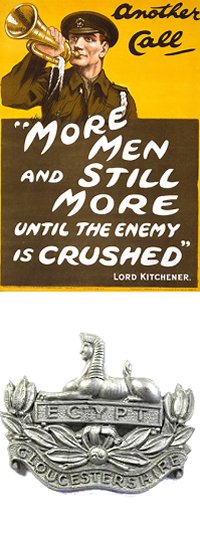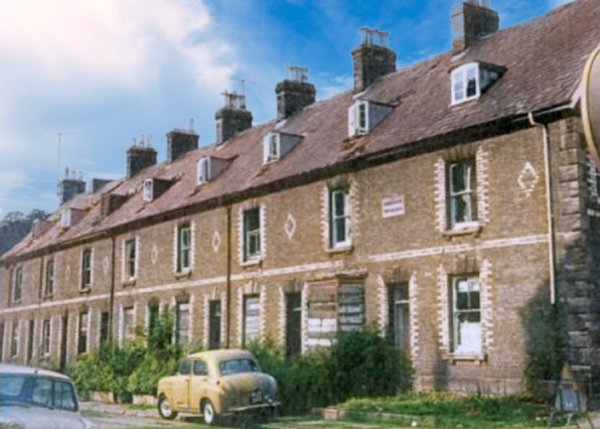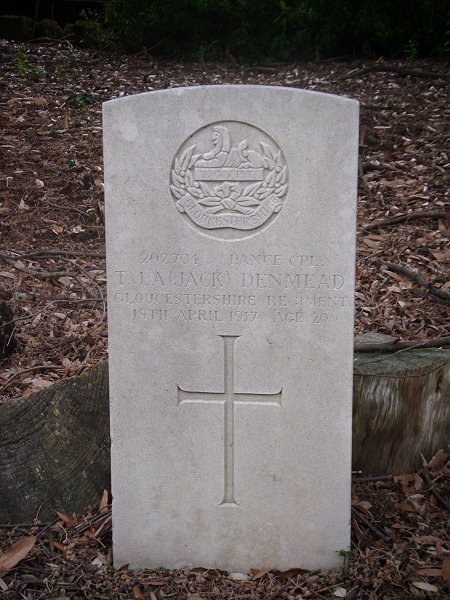yeovil at War
thomas john ambrose denmead
Died following an operation in hospital
Thomas John Ambrose Denmead, known as Jack, was born in Yeovil in the summer of 1896, the elder son of glove sorter Thomas Denmead (1867-1932) and Elizabeth née Gummer, known as Bessie (1897-1937). In the 1901 census Thomas and Bessie were listed at 2 Summerhouse Terrace with their children; 4-year old Jack and his siblings Frederick, known as Bert, and Rose aged 3 and 1 respectively. By the time of the 1911 census the family were living at 10 Newton Road and 14-year old Jack was working as a clerk in James Petter's iron foundry office in Clarence Street. He was later to work at Petter's Nautilus Works in Reckleford.
 According
to his Service
Number 202704,
Jack enlisted in
the 2nd/4th
Battalion,
Gloucestershire
Regiment during
November or
December 1916.
According
to his Service
Number 202704,
Jack enlisted in
the 2nd/4th
Battalion,
Gloucestershire
Regiment during
November or
December 1916.
2nd/4th (City of Bristol) Battalion had been formed at Bristol in September 1914 as a home service ("second line") unit. In January 1915 it came under command of the 2nd Gloucester & Worcester Brigade, 2nd South Midland Division at Northampton. The Battalion landed in France on 24 May 1916.
According to the memoirs of one soldier of the Battalion "I was posted to the 2/4th Battalion Gloucesters (Territorials) part of the 61st Division (we called it the sixty-worst). This was a second line division which got very few replacements for casualties or wastage. It was not used in main attacks usually but for holding line after attacks and in quiet sectors."
Another soldier of the Battalion recalling that the men ".... were soon going to face a period of booby traps that called for all the skill and sense not to touch anything that looked inviting, especially the village pianos. One favourite with the German booby trappers was to suspend a small shell or minenwerfer on copper wire somewhere in the church crypt with a special small container with acid-soaked wadding until the wire was rotten and not strong enough to take the weight, explosive shell, bomb or what have you. One could think of many ways in which the Germans did their traps. One special trap was very inviting; this was where civilians had had a factory many miles behind the line. They used coke, and when the Germans pushed, they in turn used the coke, but when they had to go they would bury 4 or 5 shells in a heap of coke and then start a fire. After a day or so, 4 or 5 tons of coke makes a welcome, warming place, except when the whole lot goes up."
In fact Jack was
to be in France
only a few weeks
before he was
taken ill. He
was returned to
England where he
was hospitalised
for several
months but sadly
died on 19 April
1917 following
an operation at
the Royal
Alexandra
Infirmary at
Paisley. He was
just 20 years
old.
The Western
Gazette reported
on 27 April 1917
"News reached
Yeovil last week
that Private
Jack Denmead of
the Gloster
Regiment, eldest
son of Mr Tom
Denmead, of
Newton Road, had
died following
an operation at
a military
hospital at
Paisley. Private
Denmead, who was
a little over 20
years of age,
was employed at
Messrs. Petters’
Ltd, ultimately
going to France
with his
Battalion. He
was brought home
sick some months
ago, and has
been in hospital
ever since. The
body was brought
to Yeovil from
Paisley on
Friday, the
coffin being
covered with a
number of
beautiful floral
tributes,
including tokens
from “Comrades”
Royal Alexandra
Infirmary
(Paisley), the
medical staff,
the nursing
staff, patients
in Ward 6, and
from the maids
of the hospital.
There was also a
choice floral
emblem from the
staff of the
Nautilus Works,
of Messrs.
Petters Ltd.,
and many floral
tributes from
sympathising
friends. The
funeral took
place on Monday
afternoon at the
Cemetery, the
Rev. G.C.
Seymour (curate
of the Parish
Church)
officiating. The
principal
mourners were:-
Mr. and Mrs. T.
Denmead (father
and mother),
Messrs. W.
Denmead and H.
and F. Gummer,
(uncles), Miss
A. Denmead
(aunt), and Mr.
Bert Evans,
Merthyr Tydvil
(cousin)."
Jack was buried in Yeovil Cemetery, Grave A491, and his name is inscribed on the War Memorial in the Borough.
gallery

The terrace of houses known as Summerhouse Terrace, almost certainly built by Samuel Cridland in 1875, boarded up and awaiting demolition in the mid-1960s. Jack spent his early years at No 2, with the boarded-up bay window and the car outside.

Jack Denmead's headstone.